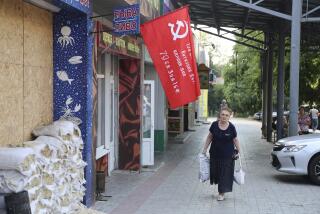Russia, Estonia Keep Eye on City’s Autonomy Vote
- Share via
NARVA, Estonia — On the Estonian bank of the River Narva, a tall white castle built by Danes in the 13th Century still guards this ancient city.
Glowering straight back at it from the river’s eastern bank is the imposing gray Fortress of Ivangorod, which was built by Czar Ivan III three centuries later and still marks the beginning of Russian territory.
Today, the two castles that once hurled cannonballs at each other look down on an eternal traffic jam on the bridge where bureaucrats create delays of up to an hour in their zeal to enforce the new Estonian-Russian border.
The ancient city of Narva, battered back and forth for centuries between Russia and its western neighbors, has again found itself on history’s uncomfortable frontier.
This weekend, Narva defied the government of Estonia by holding a referendum on an explosive question: Should the city seek autonomous status within Estonia?
Although 96% of Narva’s 83,000 residents are ethnic Russians, in 1990 the city voted in favor of Estonian independence from the Soviet Union. But the new Republic of Estonia has been reluctant to grant citizenship to the roughly 440,000 Russians and other Slavs who make up about 30% of the Estonian population. Many are former Red Army officers and their families, widely seen by Estonians as Soviet “occupiers.”
City officials say autonomy would give them the right to ignore six Estonian laws, including the citizenship statutes, that they say discriminate against the Russian-speaking population.
The Narva referendum is being watched anxiously not only in the other Baltic nations of Latvia and Lithuania, which have large Russian-speaking minorities, but also in Russia, where President Boris N. Yeltsin has denounced Estonian policies as “ethnic cleansing.”
Narva’s polls closed Saturday evening after two days of voting. Just over half of those registered had voted, city officials said, and preliminary results showed that 97% cast their votes for autonomy.
“Of course I’m for it!” Pavlevna V. Beloborodova said as she emerged from a polling booth. “I came here in 1948; I helped build this city. Why should I now have to apply for permission to live here in my own house?”
As she talked about the citizenship problems, the elderly woman began to weep. “I have nowhere else to go,” she said. “Our house (in Russia) burned down during the war. . . . I buried my husband here. How could I leave?”
It is unclear whether a vote for autonomy will bring the rebellious city concessions from the Estonian government or move Narva closer to ethnic violence.
In the capital, Tallinn, 120 miles west of Narva, the Estonian government has declared the referendum unconstitutional. In discussions in Parliament last week, lawmakers made it clear that they view the referendums in Narva and Sillamae, a smaller ethnic Russian city near Narva, as proof that the ethnic Russian residents are not loyal to Estonia.
“Riot police and maybe even regular army troops may be sent to Narva” if the referendum is held, warned Tiit Made, head of the Parliament’s foreign relations committee.
No Estonian troops appeared in Narva, but on Estonian television, government officials repeated that the referendum was illegal and urged voters to stay home.
In the polling stations, several voters said they believe that Tallinn is discriminating against the heavily Russian northeast region of Estonia by withholding credits to factories and cutting trade ties with old suppliers in the former Soviet Union--charges Estonian officials deny.
Other residents cited fear of deportation if they cannot pass the Estonian language exam necessary to receive citizenship, or if they become unemployed.
In fact, the government of Estonia has categorically stated that it will not conduct mass expulsions of ethnic Russians, including the unemployed. But the law does not spell out what happens to those who do not become citizens.
More to Read
Sign up for Essential California
The most important California stories and recommendations in your inbox every morning.
You may occasionally receive promotional content from the Los Angeles Times.













